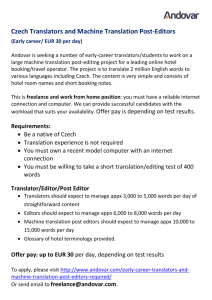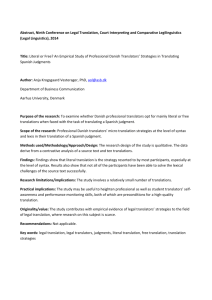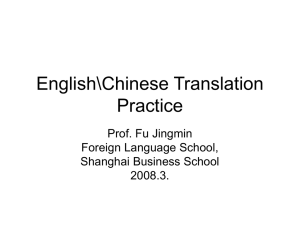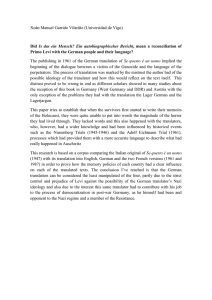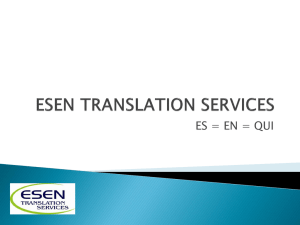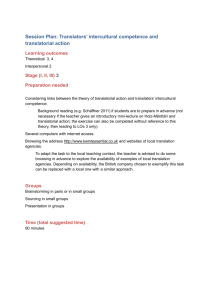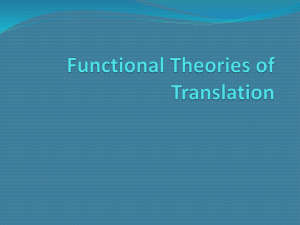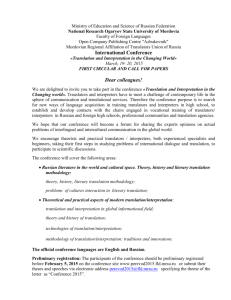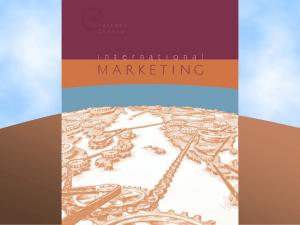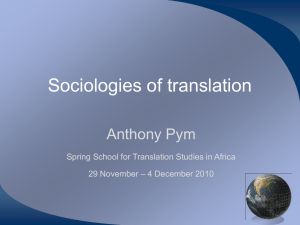Fiona Graham, European Commission
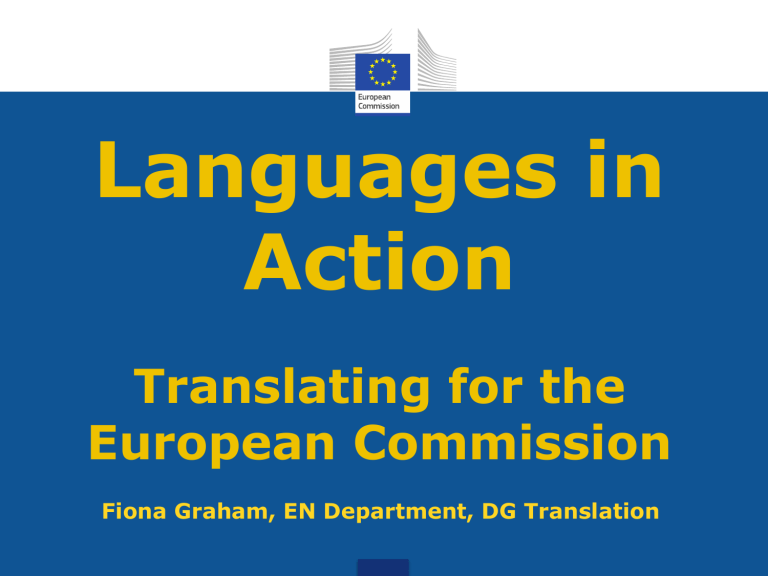
Languages in
Action
Translating for the
European Commission
Fiona Graham, EN Department, DG Translation
Outline
Why does the EU need translation? (2-7)
How is translation organised at the European
Commission? (8-11)
What qualities do translators need? (12-14)
What opportunities can we offer? (15-22)
Why? The legal basis
Treaty on the Functioning of the European
Union
Citizens can use any EU official language in their contacts with EU bodies.
Council Regulation No 1/58
Legislation must be drafted in the official languages.
Types of languages
• 23 official/working/Treaty languages:
Bulgarian, Czech, Polish, Slovak, Slovenian
Danish, Dutch, English, German, Swedish
French, Italian, Portuguese, Romanian, Spanish
Estonian, Finnish, Hungarian
Greek, Irish, Latvian, Lithuanian, Maltese
• 3 procedural languages: English, French, German
• Additional languages: Scottish Gaelic, Welsh, Basque,
Catalan and Galician
Linguists in the EU
Economic &
Social Committee
Parliament
Council
Committee of the
Regions
Court of Justice
Court of Auditors
European
Central Bank
Translators: about 4300
Interpreters
: about 1000
Translation Centre
Scenario 1: German asks Commission to expedite visa procedure for Russian relative
Scenario 2
• Denmark incentivises wind park construction
• The Commission looks into competition policy implications
How translation is organised at the
Commission
DG Translation: about 2500 translators and support staff
50% in Brussels
50% in Luxembourg
Field Offices in member countries
23
23 language departments
Over 2 million pages translated in 2011
• Growth in the number of translated pages 2000-2011
2 500 000
2 000 000
1 500 000
1 000 000
500 000
0
2000 2001 2002 2003 2004 2005 2006 2007 2008 2009 2010 2011
Electronic translation tools
• Terminology
• IATE (public)
• EUR-Lex (public)
• DGT Vista
• Quest Metasearch
• Electronic dictionaries, glossaries, search engines, Wikipedia, etc.
• Translation tools
• Translation memories,
Euramis
• Speech recognition
• Machine translation
Machine Translation:
MT@EC
Things have moved on since
‘ Les agriculteurs vis à vis de la politique agricole commune ’ came out as
‘ Farmers live to screw the Common Agricultural Policy ’ !
Recruitment criteria
You must be an EU citizen
You must hold a full university degree in languages or another field
(minimum BA)
No professional experience is required (though it’s helpful)
Knowledge of languages
• Perfect command of English
• Excellent knowledge of German or French (first source language)
• Excellent knowledge of a second source language from among the EU’s official languages
Other skills
• People with non-language degrees please apply!
• Translator profile and skills needed: see ec.europa.eu/dgs/translation/workwithus/staff/profile
Job opportunities
• Permanent job
(EU civil servant)
• Contract staff
• External contractor
(freelance)
• Trainee
Recruitment competitions for EU officials
Publication:
• Official Journal of the European Union
(C edition)
• EPSO (European Personnel Selection Office) website www.eu-careers.eu
Selection procedure: 5 to 9 months
The competition process
• Apply online (July for translators)
• Pre-selection test (numerical, verbal & abstract reasoning)
• Translation tests, group exercise, structured interview, oral presentation
What can the Commission offer?
• Varied and challenging work
• Scope to shape your own career in the Commission
• Excellent language learning opportunities
• Multicultural environment
• €4500/month starting salary
• Job security
• Good leave entitlement
• Flexible working-time arrangements
Contract staff
• Special calls for contract staff
• For more information, check regularly: ec.europa.eu/dgs/translation/workwithus
Freelance contractors
• The only way: respond to a call for tenders and have your bid accepted
• Calls for tenders for translation services are published in the Official Journal and on our website ec.europa.eu/dgs/translation/workwithus/ contractor
Traineeships
• Duration: 5 months
• Two rounds per year, starting in March and October
• For university graduates only
• For EU citizens – but a quota for other countries’ nationals
• Competence: ability to translate from two EU languages into your main language
• Monthly grant
Thank you for your attention!
Fiona.Graham@ec.europa.eu

